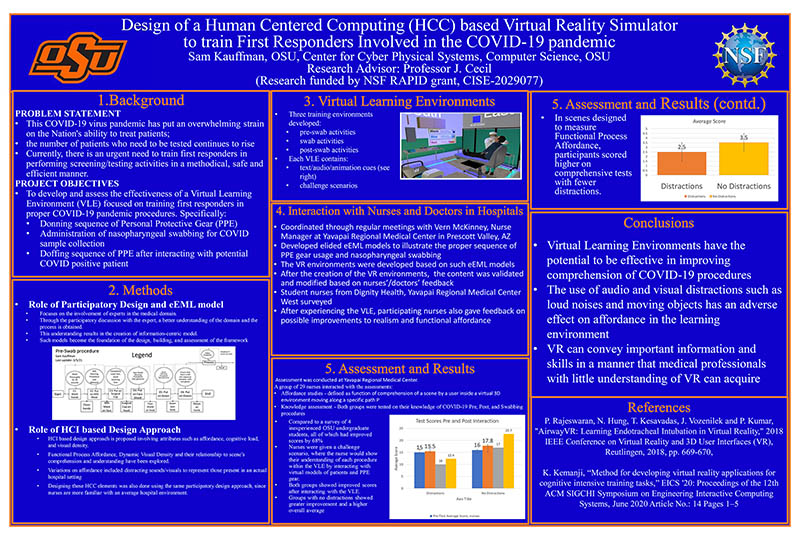
Hover to pan and click to magnify. Click again to pan at full screen.
Samuel O. Kauffman, Dept. of Computer Science, Oklahoma State University, Stillwater, OK. Faculty Advisor, Dr. Joe Cecil, Oklahoma State University, Stillwater, OK.
Samuel O. Kauffman, Dept. of Computer Science, Oklahoma State University, Stillwater, OK. Faculty Advisor, Dr. Joe Cecil, Oklahoma State University, Stillwater, OK.
ABSTRACT
Introduction: This research focuses on the design of a Virtual Reality (VR) simulator to help train nurses involved in testing and treatment of patients affected by the COVID-19 pandemic. This pandemic has placed an overwhelming strain on our Nation's ability to treat patients; the number of patients who need to be tested continues to rise. It is critical that our Nation have a larger pool of trained first responders. Currently, there is an urgent need to train such responders (nurses, physician assistants) to perform the testing and ventilator activities in a safe and efficient manner.
Methods: This research focuses on exploring HCC principles in designing a VR training simulator with two objectives: (i) increase the pool of first responders involved in COVID-19 testing and using ventilators on patients (ii) develop a more effective (and less risky) process to train and prepare such first responders. HCC principles are helping in the design of this simulator based on factors such as affordance, visual density and cognitive load.
Results: A preliminary version of this innovative 3D VR simulator has been built using the HTC Vive platform; nurses and hospital staff can wear 3D headsets and complete their training using this simulator. Initial assessment through interaction with collaborating hospitals underscore its ability to train nurses and other health care assistants effectively in a user-friendly manner.
Conclusion and Relevance: This simulator can enable the efficient and safe training of first responders involved in taking nasal samples for testing and for connecting patients to ventilators. By training virtually, they reduce their risk of infection while practicing virtually on becoming skilled at the various steps involved in the testing and ventilator setup tasks. This simulator will be distributed free of charge to all hospitals nationwide. This simulator is the first of its kind worldwide in helping us handle the outbreak of this pandemic. This project is funded by a special grant from the National Science Foundation (NSF).

DISQUS COMMENTS WILL BE SHOWN ONLY WHEN YOUR SITE IS ONLINE